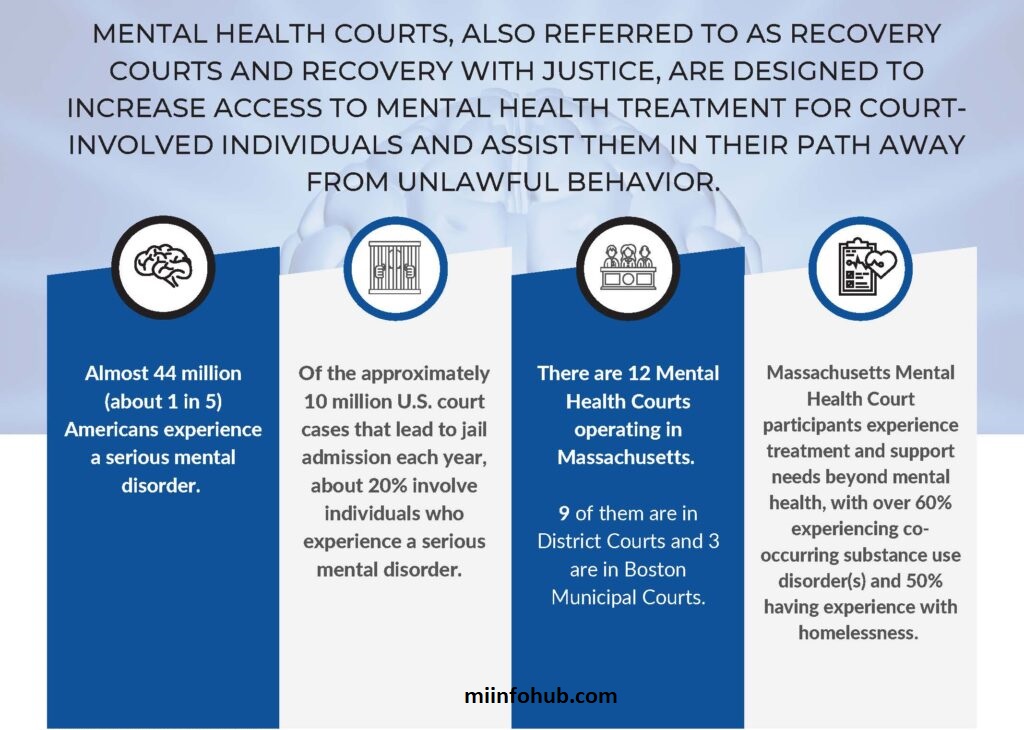Understanding Mental Health Sectioning
In Massachusetts, “sectioning” is the legal process of involuntarily committing someone to a mental health facility for evaluation and treatment. This typically occurs when a person poses a significant risk to themselves or others due to severe mental illness or substance abuse. Section 12 allows for a temporary 72-hour hold by professionals or law enforcement when a person is dangerous due to mental illness. Section 35 requires a court petition for substance abuse issues, enabling a judge to order treatment. Both sections aim to provide urgent care while protecting the individual’s rights and ensuring appropriate treatment. If you are intrusted about how to add someone to your health insurance then click here.

When Sectioning May Be Needed For Mental Health In Massachusetts
Consider sectioning if a loved one:
- Expresses Thoughts of Self-Harm or Suicide: Frequent mentions of wanting to harm themselves or end their life signal a serious crisis and require immediate attention.
- Displays Violent Behavior or Threatens Harm: Aggressive actions or threats towards others indicate potential danger and suggest underlying mental health issues needing urgent assessment.
- Engages in Reckless or Self-Destructive Acts: Dangerous behaviors, such as driving recklessly or engaging in risky activities, show emotional turmoil and the need for professional help.
- Struggles with Severe Substance Abuse: When substance use leads to health issues, impaired judgment, or irresponsibility, it highlights a serious problem that poses risks to the individual and others.
Types Of Sections In Massachusetts
- Section 12: This section allows for the involuntary hospitalization of individuals with mental health issues who pose an immediate danger to themselves or others. It can be initiated by mental health professionals, police officers, or EMTs. This process enables a quick response to stabilize the individual in a safe environment.
- Section 35: This section is specifically for individuals struggling with substance abuse disorders who present a risk to their own safety or the safety of others. Initiating Section 35 requires a petition to the court, which typically includes a hearing. This legal process ensures that the individual’s rights are considered while determining the need for involuntary treatment in a rehabilitation facility.

Who Can Request A Section For Mental Health In Massachusetts?
Massachusetts law permits certain individuals and authorities to request a section:
- Family Members: Close relatives can file a court petition for Section 35 when they believe a loved one with a substance use disorder poses a risk to themselves or others.
- Mental Health Professionals: Doctors and therapists can initiate Section 12 when they assess that an individual’s mental health risks are severe and that hospitalization is necessary for safety.
- Police Officers and EMTs: These officials can intervene in situations where they witness immediate danger or violent behavior, allowing them to initiate the necessary emergency procedures for both Section 12 and Section 35.
Steps For Sectioning Someone In Massachusetts
Identify The Need For Sectioning
- Look for signs like threats, reckless actions, self-harm behaviors, or severe addiction issues.
Consult A Mental Health Professional
- In immediate danger, call 911 to involve emergency services.
- Reach out to a psychiatrist, therapist, or primary doctor who can initiate a Section 12 evaluation if they deem it necessary.
File A Petition In Court (For Section 35)
- Visit your local district court and speak to the clerk about filing a Section 35 petition.
- Fill out the petition, clearly stating the reasons for the request, including specific behaviors and substance use issues.
- Prepare to present details about recent incidents or patterns of behavior.
Attend The Court Hearing (For Section 35)
- At the hearing, you may be asked to present evidence, including specific incidents, witness statements, or medical history.
- The judge will review the information and determine if involuntary commitment is necessary for treatment.

Court Process For Section 35
During A Section 35 Court Hearing:
- Present Evidence: Family members and witnesses may need to provide statements or documentation to support the petition for sectioning. This evidence helps demonstrate the risk the individual poses to themselves or others.
- Judge’s Decision: The judge reviews the evidence and assesses the risk associated with the individual’s behavior, particularly in cases involving substance use. Based on this evaluation, the judge may order the individual to receive treatment.
- Detention: If the petition is granted, the court issues an order for involuntary treatment. The individual may then be taken to a designated treatment facility for evaluation and care.
What Happens After Sectioning For Mental Health In Massachusetts?
- Mental Health Evaluation: Upon admission, the individual is assessed by mental health professionals to determine their specific needs and the appropriate level of care.
- Treatment Planning: If necessary, the facility develops a treatment plan. This may involve a short stay of up to 72 hours under Section 12 or a longer duration of care under Section 35.
- Discharge or Continued Care: After the evaluation, the facility will recommend either discharge if the individual is stable or an extended stay for more intensive treatment if ongoing support is required.
Rights Of The Individual Being Sectioned
People who are sectioned have several legal rights:
- Right to Know: Individuals have the right to be informed about the reasons for their involuntary commitment and the nature of their treatment.
- Right to Legal Representation: They can contact an attorney to seek legal representation, ensuring they understand their rights and the processes involved.
- Right to Refuse Treatment: Individuals have the right to refuse certain treatments unless it’s an emergency situation, allowing them some control over their care.

Common Challenges In Sectioning
Sectioning can be difficult for both the individual and their family. Common challenges include:
- Emotional Stress: Family members may experience guilt, fear, or uncertainty. Support groups and counseling can help manage these emotions.
- Legal Complexity: Understanding the legal requirements can be overwhelming. Seeking legal advice can provide clarity.
- Stigma: Mental health and substance abuse can carry social stigma, which can make the process harder. Education and support from loved ones can be invaluable.
Important Overview Of Sectioning For Mental Health And Substance Abuse Treatment in Massachusetts
| Aspect | Details |
|---|---|
| Definition | Sectioning is the legal process of involuntarily committing an individual to a mental health facility for evaluation and treatment due to risks posed by mental illness or substance abuse. |
| Relevant Laws | – Section 12: For involuntary hospitalization of individuals with severe mental health risks. – Section 35: For individuals with substance abuse disorders posing a risk to themselves or others. |
| Who Can Initiate | – Family members (for Section 35) – Mental health professionals (for Section 12) – Police officers and EMTs (in cases of immediate danger) |
| Rights of Individuals | – Right to know the reasons for commitment – Right to contact an attorney – Right to refuse certain treatments unless in an emergency |
| Process Steps | 1. Document Behavior: Collect evidence of harmful behaviors. 2. File Petition: Submit a Section 35 petition to the court or initiate Section 12. 3. Court Hearing: Attend a hearing for the judge’s review. 4. Mental Health Evaluation: Undergo assessment at a treatment facility. 5. Treatment Planning: Develop a tailored treatment plan. 6. Discharge or Continued Care: Determine next steps based on evaluation results. |
| Importance of Support | Providing emotional and practical support during this process is crucial for the individual’s recovery and can facilitate a smoother transition into treatment. |
Alternative Approaches To Sectioning
If sectioning feels too drastic, try these alternatives:
- Voluntary Admission: Encourage the person to seek help on their own, with support from friends or family.
- Outpatient Therapy: Therapy and counseling provide regular support without hospitalization.
- Community Resources: Massachusetts offers crisis hotlines, mental health programs, and substance abuse counseling services.
Case Example: When Sectioning Might Help
Imagine a loved one struggling with severe substance abuse. They may refuse treatment and exhibit signs of aggression, creating concern for their safety and the safety of others. In such cases, it is crucial to document their behavior, noting specific incidents that highlight the risk they pose. With this evidence in hand, you can file a Section 35 petition in court, seeking legal intervention to direct them to a treatment program.
This petition serves as a formal request for the court to evaluate the situation and consider involuntary commitment for the individual. If the court grants the petition, it can order the individual to undergo treatment, even if they resist voluntary care. This legal intervention may be a vital first step toward recovery, providing the individual with the necessary support to address their substance abuse issues and helping them regain control over their life.

Aftercare Options Post-Sectioning
Once released from a facility, aftercare options help maintain recovery:
- Outpatient Counseling: Regular therapy sessions to help prevent relapse.
- Support Groups: Groups like Alcoholics Anonymous or Narcotics Anonymous offer community support.
- Family Involvement: Family therapy can help rebuild relationships and offer ongoing support.
Key Resources In Massachusetts
- Massachusetts Department of Mental Health: Offers extensive support resources and guidance for families dealing with mental health crises.
- Massachusetts Behavioral Health Help Line: For immediate assistance, call 833-773-2445.
- Samaritans, Inc.: Provides crisis support for emotional distress. Call 877-870-4673.

Final Thoughts
Sectioning someone for mental health or substance abuse treatment in Massachusetts is a significant and often complex decision. It involves various steps that require careful consideration and understanding. From assessing the individual’s eligibility to navigating the legal process, each step plays a critical role in ensuring that your loved one receives the care they need.
Following the guidelines for sectioning, including understanding Sections 12 and 35, can help you make informed decisions. Seeking professional advice from mental health experts and legal representatives is crucial for effective intervention.
Remember, your support is invaluable during this challenging time. Being there for your loved one can make a difference in their journey toward recovery and a healthier life. Through proper evaluation and treatment, there is hope for healing and a brighter future.


